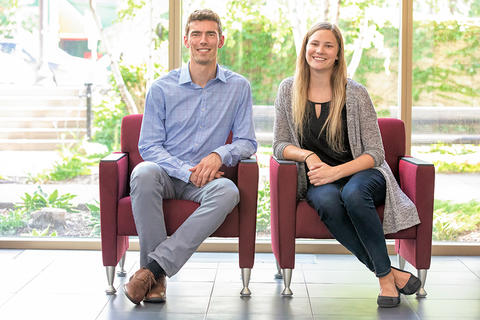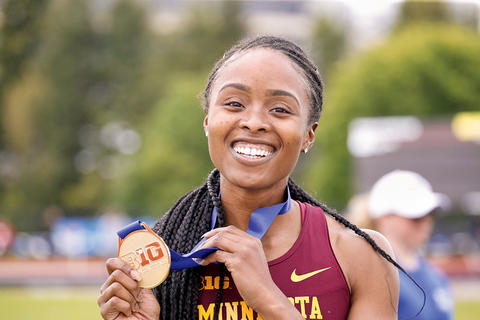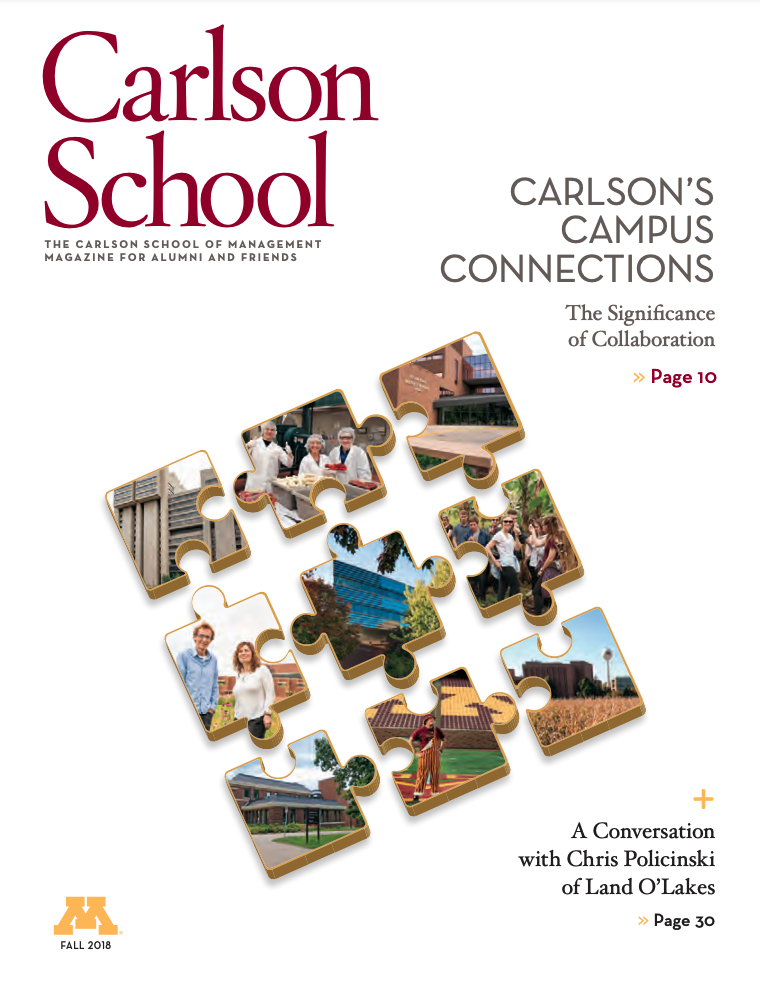
Extracurricular Engagements
Saturday, September 1, 2018
By Kevin Moe
As the president of the Rooter Club, Matthew Rowley is able to combine two of his passions—sports and leading people to success. “I embrace every moment of this experience because I know that I am lucky to have found such a unique opportunity,” he says.
The Rooter Club is the official student section of Golden Gophers Football. The club exists to bring school spirit to football games and across campus and there are more than 150 members involved in the club throughout the season.
Rowley, a double major in supply chain and operations management and management information systems with a minor in business analytics, initially became involved with the Rooter Club in his first year when he was selected to be the Freshman Officer of the club. Through his continued involvement, he was named vice president in his sophomore year before his appointment to the president.
“As president, I am tasked with working with Gopher Sports Marketing to coordinate promotional activities, organize watch parties, and plan member engagement events with my executive boards,” he says. “In addition, my board and I arrive three hours before kick-off to assist in the setup of any game-time needs.”
Rowley says cross-campus activities such as the Rooter Club offer students a way to not silo themselves to a particular major or school. “I know too many students in Carlson who barely ever leave because that is where they go to school, work, participate in club activities, and sometimes even live,” he says.
Cross-campus activities also provide students a more diverse outlook that can benefit them in their own personal and career development. “I have met some amazing people through my experience who have had a major impact in shaping who I am today,” Rowley says.
Easing the Tax Burden
Also having an impact is the Volunteer Tax Assistance Program (VTAP). Initially starting as a course within the Carlson School, VTAP has since grown by leaps and bounds. It is now a nonprofit student organization that operates as an IRS-supported Volunteer Income Tax Assistance (VITA) site.
“We prepare taxes for lower-income individuals to relieve some of the stress about such a complex topic,” says co-director Victoria Anderson, a Carlson School senior hoping to earn her CPA and go to work for one of the big four after graduation.
Together, VTAP’s 90-strong volunteer group helped about 1,400 resident and 700 nonresident taxpayers during a recent tax season.
“Volunteers gets hands-on experience with preparing taxes, which is beneficial both as a life skill and for preparing for their career, especially accountants,” Anderson says. “For volunteers who are not business majors, they get client experience that is hard to get elsewhere due to the diversity of people we prepare returns for.”
One such volunteer is Matthew Boehne, who is in his senior year studying chemical engineering with a minor in chemistry. His goal is to work as an engineer in R&D for a Fortune 500 company in the Twin Cities. Volunteering with VTAP was a way of branching out.
During the last tax season, he was a quality reviewer, which meant he was in charge of verifying that the already filled out tax returns were correct. “Currently as one of the new co-directors of the organization, I have been involved with applying for grants and securing corporate sponsorships,” he says. “My role has been to ensure that we have the funds to help members of our community.”
Boehne says he has learned a tremendous amount. “As an engineer, I feel like I have missed out on a lot of business-related topics,” he says. “I believe VTAP has been a unique experience in that I have had the opportunity to learn about taxes, client interactions, and leadership.”
Having student groups that accept students from across the entire campus is critical to success, as that is how the real world operates, Boehne says. “Within VTAP, we have a wide array of majors and, because of that, I think everyone has learned something new from someone else,” he says. “It is very cool to see so many people interested in taxes who do not plan on making it their profession. I think it is a testament to the strength of the organization, especially seeing how many people become invested in helping out the community after learning a valuable skill.”
For more information about VTAP, email vtap@umn.edu.
She Has Design on Her Mind
What senior Roohi Katarya loves the most about her major in product design is that it is extremely interdisciplinary. “I get to take classes in business, engineering, and design,” she says. “When I graduate, I hope to start out as a product design consultant, pursue an MBA, and eventually open my own design firm.”
She also is one of the executive directors of Design U, a student-led design consultancy whose mission is to provide members with hands-on, real-world experience. The organization started in the College of Science and Engineering, but now encompasses students from the College of Design and the Carlson School as well.
Currently there are about 60 students in the organization. They partner with startups and nonprofits around the Twin Cities area and offer services in research and strategy, digital design, and prototyping. Each of these divisions is composed of three to four teams of five students from a variety of backgrounds, majors, skillsets, and ages. “We work with an equal amount of diverse clients, from early-stage startups like Guide & Seek to more established firms like HOM Furniture,” Katarya says.
Design U’s purpose is to bring together diverse students as well. “It’s so important to have different perspectives; not only does it emulate a real-world experience of working in industry, the diversity of students helps push forward the best products and solutions for the clients we serve,” Katarya says. “Every team member brings a valuable and unique insight from their respective discipline and are able to apply it in a tangible, meaningful way.”
As an executive director, Katarya oversees six branches of an executive board, including Business Development, Marketing, Outreach, Event Planning, Finance, and HR. “At a high level, my role is focused on client outreach and relations, member recruitment, planning, marketing our major events, and securing grants and external sponsorships,” she says.
From a professional as well as a personal standpoint, Design U has been the most impactful and influential experience of Katarya’s college career, she says. “I have gained skills in leadership, project management, and critical thinking that I would not have gained anywhere else,” she says. “This group has taught me how to apply a growth mindset and effectively communicate with students, clients, and University leaders and has provided me with a network of mentors and industry professionals.”
Record-Breaking Runner
A former walk-on for the Gophers’ track team, Emerald Egwim, ’18 BSB, became an accomplished athlete while at the U of M. She broke four indoor and outdoor school records, won a Big Ten championship title individually and three as part of a team, and competed for Nigeria at the 2017 Track and Field World Championship Games.
She did all this while majoring in management information systems and minoring in business law at the Carlson School.
“I do not remember a time in my education that I was only going to school. I have always been involved in a sport and often times more extra-curricular activities, but the collegiate D1 level is different,” she says. “It can be challenging at times, but support, effective communication, and advocating for myself helped me tremendously.”
Student-athletes and students who are highly involved in school have to employ great time management skills in order to simply stay on top of everything, she says. Communication skills, organization, efficiency, patience, and perseverance are also qualities that are obtained from being highly involved.
While at the Carlson School, she took part in IBUS 3999, a self-designed option through the Carlson Global Institute, to complete her international experience requirement. She went to Kuala Lumpur in Malaysia to work for KPMG as an IT audit and attestation intern, finding this experience to also be a fount of insight.
“Complete immersion in a culture different from your own allows you to expand your thinking and challenge your beliefs in a way that the classroom cannot,” she says. “We are a culmination of the experiences that have shaped us. As business students and as global citizens, it is important that we understand and celebrate cross-cultural differences.”
It is also important to remember that oftentimes there are more similarities than differences, too. “I have a different appreciation for South-East Asia and the cultures within and for the way business is conducted in that region as well,” she says. “I could not have obtained those experiences elsewhere.”
Earlier this year, Egwim was selected as one of Poets & Quants’ 2018 Best and Brightest. She credits many things for her successes, including cross-campus activities. “I believe they can help build communities with the campus,” she says.
Binary Bucks
Back in 2016, undergraduate MIS student Justin Ehrenhofer was perusing the campus clubs at the University, looking for one dealing in cryptocurrency. If there were none, he had the desire to start one himself.
Although he’s now interning for a consulting company in cybersecurity, Ehrenhofer wants to focus on cryptocurrency as much as possible. “If opportunities allow, I would like to work entirely with cryptocurrency and privacy systems,” he says. “Otherwise, I will continue to work in technology while remaining a contributor to these systems.”
He ended up finding a campus cryptocurrency club started by Amber Weise, ’17 BSB, and computer science major Ethan Schulz and eagerly came aboard.
“I asked to speak with Amber over coffee and I helped the board plan the first meeting,” he says. “For my activism and work, they offered me the position of vice president, which I accepted. In the fall, Ethan and I became joint presidents, which we hold to this day.”
Cryptocurrency functions similar to an online bank account, except the underlying asset is maintained by a large network of computers. These computers are not maintained by a single central authority, so it is more decentralized. There are hundreds of different cryptocurrencies—most of them worthless—but some are working on innovative projects that have the potential to offer advantages unseen in more centralized systems.
The Cryptocurrency Club can be explained with three important pillars: education, advocacy, and community. “We discuss educational topics to interested students, staff, and community members,” Ehrenhofer says. “We make sure the Twin Cities has a strong organization and body of knowledge that students can learn from.”
Club meeting topics include introductory meetings, coding sessions, and deep dives into the mechanics of specific cryptocurrencies, among other topics. “When we started the club, the cryptocurrency space was even less developed than it is now,” Ehrenhofer says. “There were few cryptocurrency organizations in Minnesota at all, let alone those that prepared educational materials.”
The U-wide club has allowed Ehrenhofer to connect to other enthusiasts on campus and in the wider community who he would not have otherwise met. It also pushes him to prepare quality educational materials, stay updated with the latest news, and have confidence to advocate for cryptocurrency projects he finds interesting.
“We remain in constant communication with driven students at other universities,” he says. “We use these connections to share experiences and advice, connect with leading industry professionals, and build the cryptocurrency community.”
The University of Wisconsin at Madison has a growing cryptocurrency student organization, and Ehrenhofer took the time to drive down and speak at two of its meetings and continues to help provide many of its educational materials. He also spoke with the president of Michigan Fintech before the start of the recent school year to help get its club off the ground.
“We hope to build a wider connection going forward with our new dedicated outreach committee,” he says. “Cross-campus collaboration is critical, since the barriers to entry are still high and the amount of expertise is low. By helping other organizations, we can achieve our missions better than pursuing these alone.”
She Means Business
When Carmen Nusbaum was a senior in high school, she attended Spark, a recruiting event hosted with Women in Business (WIB). “I had the chance to meet women at Carlson and hear about their journeys and how WIB helped them find a place and be confident future business leaders,” she says. “Because of this, I knew I had to be a part of WIB and it was the first organization I joined when I came to the U of M.”
WIB, open to all U students, is dedicated to bringing women together in business-related fields through networking, speakers, volunteering, and social events. And as a member, Nusbaum has worn a few different hats over the years. When she was a freshman, she got to be a part of the planning process for the group’s annual charity gala. “Working on that team and making connections was an awesome way to get my toes wet,” she says.
As a sophomore, she was the vice president of member relations and was in charge of all recruitment and running WIB’s buddy program, a program that pairs new and returning WIB members together. She became the vice president of member development as a junior, leading a team of five women and working with them to plan biweekly meetings centered around empowering and inspiring the 70-plus members in attendance.
Now, as a Carlson School senior, she is the president of the organization, overseeing the strategic direction of WIB and working with a stellar team of women on the executive board.
After graduation, she plans to pursue a career in human resources, finding ways to attract top-tier individuals and leverage their strengths to drive business results in an ethical and socially responsible organization. To help her in this regard, she has gleaned a lot of insight from WIB.
Nusbaum says her involvement with WIB has allowed her to use principles learned in her classes about working with and leading people and seeing them as more than just concepts. “You learn the true nitty gritty of teamwork and leadership,” she says. “I’ve learned that leadership is not necessarily inherent—it is something that takes work, practice, and constant effort. It is something that is dynamic and constantly challenges you to evaluate and understand yourself. My involvement has truly allowed me to understand the conceptual that is taught.”
Nusbaum feels that cross-campus collaboration offers a tremendous potential to use her group’s influence to drive positive change across the University of Minnesota. “The conversations regarding gender equality are no longer just between women,” she says. “In order to get to a more fair and equal place, it is essential for us to engage with other organizations and learn how we can support and learn from each other to achieve our goals.”
She’s also excited about the potential for different student organizations at the Carlson School to come together and support each other. “I think the students here are curious, inquisitive, and above all, driven,” she says. “When you can unite and harness that type of energy and motivation, I believe that we can really live Carlson’s motto of ‘Business as a Force for Good.’”



